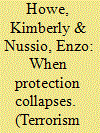| Srl | Item |
| 1 |
ID:
187118


|
|
|
|
|
| Summary/Abstract |
Researchers who wish to engage with survivors of conflict and violence face a range of complex ethical issues – including psychological dimensions of research – often with few resources or little support. This article draws on the author’s reflections as both a trauma therapist and field researcher and bridges the fields of mental health and conflict studies to explore two questions: 1) How can a researcher reduce the possibility of retraumatizing or causing psychological harm to study participants? 2) How can she diminish the possibility of being psychologically harmed herself? The author argues that a researcher must have a foundational understanding of psychological trauma, cultivate an awareness of the differences between research and healing, sharpen her interviewing skills, and identify means of co-producing knowledge to reduce the possibility for retraumatization. Researchers can prepare themselves for the psychological impacts of research by increasing self-awareness, engaging a variety of social and professional supports, and limiting exposure to traumatic material. The author argues for institutions to increase their responsibility for the well-being of researchers. This article begins to sketch the contours of ‘trauma-informed methodologies’ and contributes to the broader discussion of research ethics of fieldwork and conflict.
|
|
|
|
|
|
|
|
|
|
|
|
|
|
|
|
| 2 |
ID:
148932


|
|
|
|
|
| Summary/Abstract |
The implementation of peacebuilding activities, including the demobilization of non-state illegal actors, does not necessarily bring about a reduction in violence. While there are several theories that address the causes of persistent violence, there are few that adequately explain why rates of violence can rapidly increase in a post-demobilization context. Using the method of process tracing, this article explores the case of Córdoba Department, Colombia, where rates of violence have increased after the demobilization of paramilitary groups (Autodefensas Unidas de Colombia [AUC]) in 2005. We argue that the AUC created and maintained a monopolistic illegal protection system during its years of operation, and this type of local order was able to contain violence. After demobilization, the protection system was disrupted and as a consequence, new competition between post-demobilization criminal organizations for existing illegal rents developed, petty crime became pervasive, and revenge killings spiked, thus contributing to increased rates of violence in the post-demobilization period. Our theory about the breakdown of protection finds support in other AUC-dominated regions of Colombia.
|
|
|
|
|
|
|
|
|
|
|
|
|
|
|
|